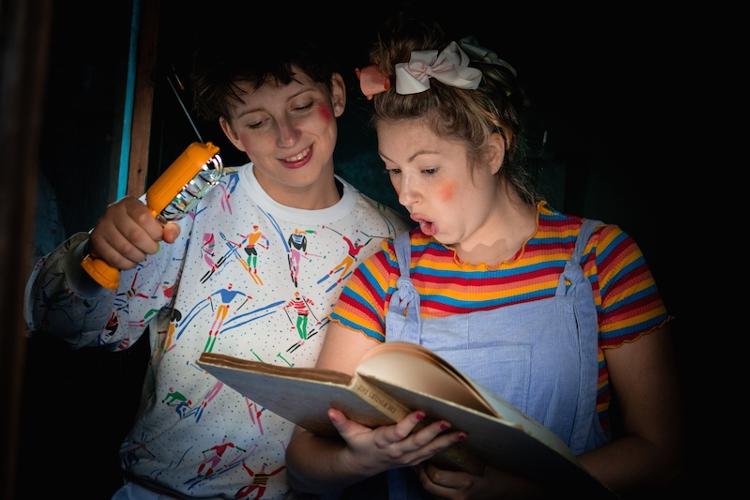Although from the outset, Flumps seems like a sweet story of freedom and fun, the darker undertones may suggest otherwise. Following Harvey, aged 13, and his little sister Felicity, aged 8, they navigate a summer between them, after the unexpected disappearance of their mother.
Cleverly weaving child-like innocence into the piece, particularly from Felicity (played by Emma Pallett, who also wrote the production), she is shown as eager and charismatic, excited to embrace whatever comes next- especially if it is eating Flumps. Harvey (played by Susie Coutts) has a bit more of a grown-up attitude about him, though this has a touch of aching sadness as his understanding of the world is far beyond the knowledge it should be at that age. For example, with no money, the pair must venture to the food bank, and the somewhat unsuccessful trip leads to discussions on stealing to get by. This forced adult agenda occasionally leads to some dramatic irony, as we understand scenarios before they appear in the script, and it is used with comedic effect often; the different perspectives between the characters being particularly noticeable in the interjectory breaks where they talk directly to the audience about their perceptions of various situations. The fantasies built by the siblings seem otherworldly to their poverty, and life in a caravan, but seemingly a relevant reflection of lives today.
When meeting some new furry 'friends', some puppetry is used, which, although limited on the realism it can achieve, is a fitting element to the performance. Additionally, the animals enhance the sense of togetherness for the pair, and longing to not be separated, despite it all, as well as the feeling of seeing what others have, and yet not getting to have it themselves. Directed by Everleigh Brenner, the show is staged to maximise all the area given in the tiny space. Props such as plastic crates and tin cans are frequently used, as well as a pipe frame, which acts as a door: although difficult to manoeuvre at moments, it is sufficient for this depiction.
While both parts are represented by adults, their nuances typically imitate a young girl, and a new teenager. There are quips in the piece that are genuinely funny, and a few that are definitely on the deeper side too.
Flumps is a tragicomedy with potential. It manages to capture an analysis on childhood in an entertaining manner, and give audiences some thought provoking contemplation, as to what they'd do if they found themselves in the situation.
It runs until 28 August.
Review: Hannah Crouch

